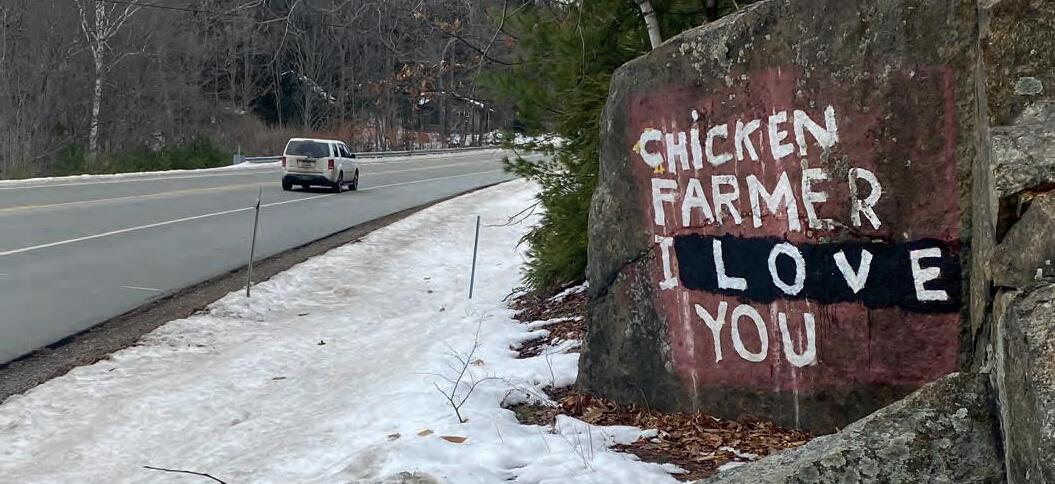
3 minute read
Chicken Farmer, We Love You (Still)
BY MARK HAYWARD
What is the value of a single word? As a writer, I have suffered while editors eliminated phrases, sentences, even entire pages. So the deletion of a mere, likely superfluous, word is acceptable, even welcome.
Yet, in other circumstances, the loss of a single word can destroy any nuance, any poetry, any mystery in a message.
That happened last fall to New Hampshire’s most famous piece of graffiti, which is located on a granite outcropping beside Route 103 in the western Merrimack County town of Newbury.
Gone is the five-letter word “still” from the previously time-honored proclamation “Chicken farmer I still love you.”
To me, the word “still” generated mystery and speculation. What transgression had prompted the adverb? Had the chicken farmer lost the farm? Had he been pecking around in another’s hen house?
To others, it meant that love had withstood the test of time. Or as Newbury selectmen described the graffiti back in 1997, a “message of faith, love and endurance.”
Now, the word that made the message of love beloved is gone.
The message falls as flat as the tags and bubble letters sprayed onto highway sound walls in Manchester.
A statement worthy of Steinbeck or Hemingway diminished to something like a ChatGPT regurgitation.
A golden anniversary reduced to a onenight hookup.
“I don’t know what happened. It just changed for no reason,” said Heather Chvala, owner of Rainbow Garage, which is about a quarter mile east of the ledge. She wants the “still” back.
“That’s what it always said.”
Aesthetically, the revision is hideous. L O V E is spaced out in glaring white letters on a glossy black background, while the remainder of the message features the warm, rust-colored background.
Town officials confirmed that the revision took place in November but declined to discuss anything else.
The message first appeared in the 1970s, according to some reports, and has achieved legendary status.
A Google search finds articles, including a 1998 take in Yankee magazine. Google Maps calls it a historical landmark. There’s a fiddle tune named after it. The town hosts a Chicken Farmer 5K in the summer.
You can find a podcast episode, social media discussions and a short film.
In 2017, New Hampshire Public Radio’s Page Sutherland put her investigative reporting skills to task. She came up with two possible explanations.
Also reported by Yankee Magazine, one version said the original message was written by a teenage boy infatuated with a girl who lived across the street from the ledge. Sutherland tracked down the muse, whose family raised chickens in the ’70s. She didn’t know who her secret admirer was.
Sutherland kept scratching around. She found another tale, and a well-placed source who gave names and dates. But confirmation was impossible; both the chicken farmer and his love interest had died.
In her piece, Sutherland stressed that several in town don’t want to know the origins, preferring the mystique of a legend to the certainty of journalism.
I like that idea, so I won’t repeat that version here. If you want, you can find it in a Google search.
Yet there are some details that are part of the official record. By 1997, complaints surfaced about the original message, which read “Chicken farmer I love you.”
The state Department of Transportation painted it over. Outraged, Newbury residents signed petitions, and selectmen petitioned the DOT to keep the message intact.
The DOT obliged, and when the message reappeared, it included the word “still.”
Which adds another wrinkle to the story. Apparently, the “still” does not modify love, but the fight to keep the message up.
Not so much romantic endurance, but righteous obstinance.
And what could be more New Hampshire than that?










